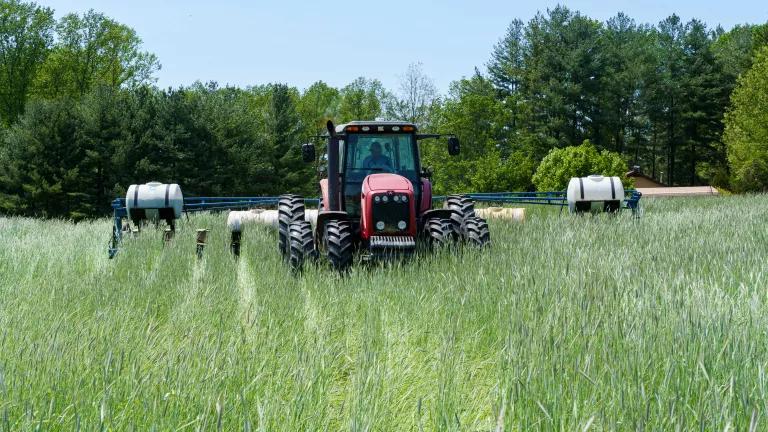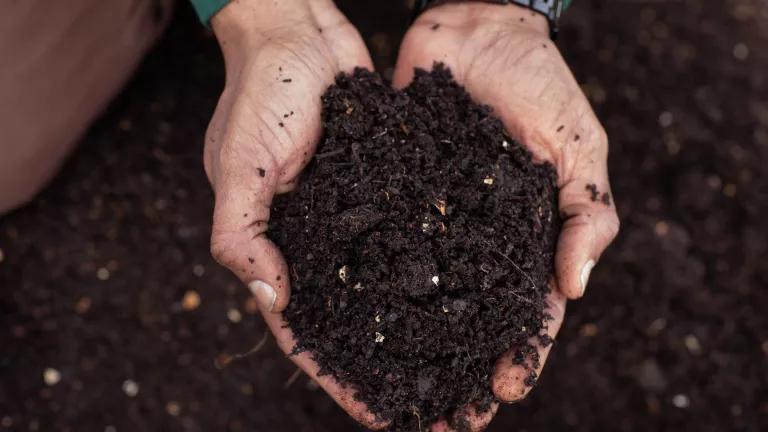Model Reporting Ordinance for Food Waste Generators
This model makes it easier for municipalities to collect data on food waste and surplus food generation, increase awareness of the problem of food waste, and reduce disposal of food waste in landfills and incinerators.
Co-authored with Linda Breggin and Jessica Sugarman, Environmental Law Institute
A new model ordinance on mandatory reporting for large food waste generators, developed by the Environmental Law Institute (ELI) and NRDC, could make it easier for municipalities around the country to collect data on food waste and surplus food generation, increase awareness of the problem of food waste, and ultimately lead to reductions of disposal of food waste in landfills and incinerators.
Up to 40 percent of food in the United States is wasted—and municipalities and other types of local governments are uniquely well-positioned to address our nation’s food waste problem. Local governments are primarily responsible for collecting and managing waste and for permitting and regulating food service businesses, and may also be concerned with addressing food insecurity among residents and meeting climate and sustainability goals. Food waste and surplus food generation data can direct local government food waste reduction efforts to where they are likely to be most effective.
To help local governments in their efforts to better understand and combat food waste, this new model ordinance is an off-the-shelf, easily adaptable tool that can be used by municipalities to require large generators, including businesses, nonprofit organizations, and municipal governmental subunits, to measure and report on their food waste generation. Additionally, covered entities must include in their reports the types and amounts of surplus food donated, as well as the amount of food scraps recycled and the destination of the recycled scraps. The model applies to large food waste generators—for example, those that generate two tons or more per week—because they are typically well equipped to measure their food waste and donate surplus food, as compared to smaller entities and households.
There are numerous economic, environmental, and social benefits associated with food waste reduction that can incentivize municipal action on food waste. For example, reducing food waste can extend the useful life of landfills, which are costly to establish and expand. Reduction also can reduce reliance on and operating costs associated with both landfills and incinerators, which release greenhouse gasses and other harmful air pollutants, and are disproportionately sited in low-income communities and communities of color. Rescuing and distributing surplus food rather than landfilling or incinerating it can also help address food insecurity, which communities of color disproportionately face, and recycling food scraps into compost can create green jobs and reduce operational costs by reducing the demand for irrigation and fertilizer. What’s more, putting surplus food and food scraps to good use rather than throwing them in the trash helps to avoid wasting all of the resources used to grow, harvest, transport, store, and prepare them.
Although well over a dozen states and municipalities have enacted laws and ordinances aimed at diverting food waste and other organic materials from landfills, most of which include a reporting component, many municipalities are not ready to impose mandates and may prefer to take interim steps first. Measurement and reporting can help build support for and ease the burden of implementing further food waste reduction or disposal diversion measures, and the data generated and provided to the municipality pursuant to the reporting ordinance can help inform changes to existing waste practices and requirements.
Further, studies indicate that simply measuring food waste, as the model ordinance requires, may motivate awareness and behavior change that leads to reducing food waste, supporting the adage that “what gets measured gets managed.”
The model provides clean, streamlined language that can be enacted as is by municipalities, based on extensive research on best practices from around the country. The footnoted version with commentaries and the background memorandum provide additional background information, explain the benefits of key provisions and alternative approaches, and provide links to examples—all of which are intended to help guide stakeholders and policymakers in tailoring the ordinance to the circumstances of their municipality. For example, although the model ordinance focuses on food waste, municipalities could instead expand their reporting requirement to cover all organics, including compostable serviceware and yard waste. And while the model ordinance covers entities that generate a total annual average of two tons per week or more of food waste, municipalities may choose a higher or lower threshold, or opt for a phased-in approach that lowers the threshold over time. An accompanying presentation is intended for use by local government officials or other stakeholders in explaining the model mandatory reporting ordinance to those who might be unfamiliar.
Linda Breggin, Director of ELI’s Center for State, Tribal, and Local Environmental Programs, noted, "The model provides a tool for municipalities to obtain valuable data that will inform their efforts to reduce food waste—as well as realize myriad attendant benefits such as lowering carbon emissions and and helping suggest strategies to reduce food insecurity."
The model ordinance was developed as part of the Nashville Food Waste Initiative (NFWI), which engages local partners in preventing food waste, rescuing surplus food, and recycling what is left to build healthy soil. Co-author Linda Breggin serves as a Senior Attorney and Director of ELI’s Center for State, Tribal, and Local Environmental Programs. Co-author Jessie Sugarman is a Research Associate at ELI, supporting the Institute’s work with NFWI. Additional policy resources and information can be found on NRDC's Food Matters page as well as at the sites for the Center and the ELI Food Waste Initiative.




